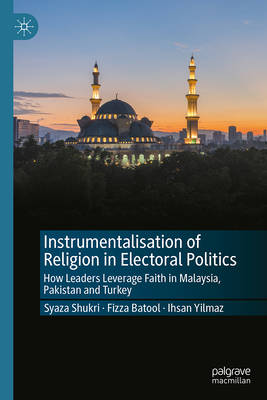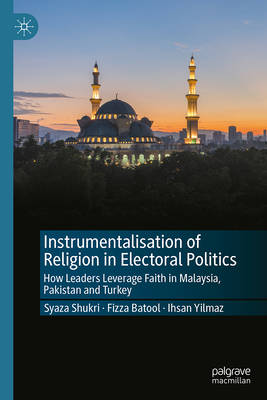
- Retrait gratuit dans votre magasin Club
- 7.000.000 titres dans notre catalogue
- Payer en toute sécurité
- Toujours un magasin près de chez vous
- Retrait gratuit dans votre magasin Club
- 7.000.0000 titres dans notre catalogue
- Payer en toute sécurité
- Toujours un magasin près de chez vous
Instrumentalisation of Religion in Electoral Politics
How Leaders Leverage Faith in Malaysia, Pakistan and Turkey
Syaza Shukri, Fizza Batool, Ihsan YilmazDescription
This book examines the critical intersection of religion, democracy, and political leadership in three prominent Muslim-majority states--Malaysia, Pakistan and Turkey. It offers a comparative analysis of the political careers and strategies of Mahathir Mohamad, Nawaz Sharif and Recep Tayyip Erdogan, exploring how these leaders have strategically instrumentalized religion to shape their political narratives, mobilize public support, and consolidate power. By examining the adaptive use of religion as a tool for governance, the book sheds light on the broader dynamics of religious politics in contemporary democracies.
Using qualitative research methods, the book investigates the political rhetoric, policy decisions, and symbolic actions of these leaders, analyzing how they navigate the tensions between Islamic principles and democratic institutions. Drawing on extensive historical and contextual data, it categorizes religious instrumentalization into three fluid strategies: conservatism, nationalism, and populism. This innovative framework offers readers a fresh perspective on how religion functions as a versatile political tool, making it highly relevant to scholars and practitioners in political science, sociology, and religious studies.
Spécifications
Parties prenantes
- Auteur(s) :
- Editeur:
Contenu
- Nombre de pages :
- 230
- Langue:
- Anglais
Caractéristiques
- EAN:
- 9789819528479
- Date de parution :
- 17-11-25
- Format:
- Livre relié
- Format numérique:
- Genaaid
- Dimensions :
- 155 mm x 235 mm

Les avis
Nous publions uniquement les avis qui respectent les conditions requises. Consultez nos conditions pour les avis.






